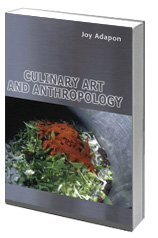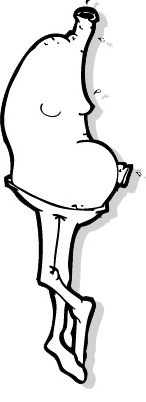All I Want For Christmas: Four New Food Books
Tuesday, 16 December 2008 by Dr Maytel
Whilst browsing the book exhibition at the recent anthropology conference on in Auckland I found four new food books I wouldn't mind having for light reading.
Bite Me

Synopsis
Food is not only something we eat, it is something we use to define ourselves. Ingestion and incorporation are central to our connection with the world outside our bodies. Food's powerful social, economic, political and symbolic roles cannot be ignored - what we eat is a marker of power, cultural capital, class, ethnic and racial identity. "Bite Me" considers the ways in which popular culture reveals our relationship with food and our own bodies and how these have become an arena for political and ideological battles. Drawing on an extraordinary range of material - films, books, comics, songs, music videos, websites, slang, performances, advertising and mass-produced objects - "Bite Me" invites the reader to take a fresh look at today's products and practices to see how much food shapes our lives, perceptions and identities.
Food: The Key Concepts

Synopsis
This book offers an exciting, coherent and interdisciplinary introduction to the study of food studies for the beginning reader. Food choices, the author argues, are the result of a complex negotiation among three competing considerations: the consumers' identity; matters of convenience, including price; and an awareness of the consequences of what is consumed. The book concludes with an examination of two very different future scenarios for feeding the world's population; the technological fix, which looks to science to provide the solution to our future food needs, and the anthropological fix, which hopes to change our expectations and behaviors. As a whole this book provides an essential overview to this increasingly critical field of enquiry.
Food and Globalisation

Synopsis
Food has a special significance in the expanding field of global history. Food markets were the first to become globally integrated, linking distant cultures of the world, and in no other area have the interactions between global exchange and local cultural practices been as pronounced as in changing food cultures.
In this wide-ranging and fascinating book, the authors provide an historical overview of the relationship between food and globalization in the modern world. Together, the chapters of this book provide a fresh perspective on both global history and food studies. As such, this book will be of interest to a wide range of students and scholars of history, food studies, sociology, anthropology and globalization.
Culinary Art and Anthropology

Synopsis
Culinary Art and Anthropology is an anthropological study of food. It focuses on taste and flavour using an original interpretation of Alfred Gell's theory of the 'art nexus'. Grounded in ethnography, it explores the notion of cooking as an embodied skill and artistic practice. The integral role and concept of 'flavour' in everyday life is examined among cottage industry barbacoa makers in Milpa Alta, an outer district of Mexico City. Women's work and local festive occasions are examined against a background of material on professional chefs who reproduce 'traditional' Mexican cooking in restaurant settings.
Including recipes to allow readers to practise the art of Mexican cooking, Culinary Art and Anthropology offers a sensual, theoretically sophisticated model for understanding food anthropologically. It will appeal to social scientists, food lovers, and those interested in the growing fields of food studies and the anthropology of the senses.
Oh and an ice caddy with lid for whisky drinking purposes, a jewellery box, new handbag, and a nice arm chair please Santa
Bite Me

Synopsis
Food is not only something we eat, it is something we use to define ourselves. Ingestion and incorporation are central to our connection with the world outside our bodies. Food's powerful social, economic, political and symbolic roles cannot be ignored - what we eat is a marker of power, cultural capital, class, ethnic and racial identity. "Bite Me" considers the ways in which popular culture reveals our relationship with food and our own bodies and how these have become an arena for political and ideological battles. Drawing on an extraordinary range of material - films, books, comics, songs, music videos, websites, slang, performances, advertising and mass-produced objects - "Bite Me" invites the reader to take a fresh look at today's products and practices to see how much food shapes our lives, perceptions and identities.
Food: The Key Concepts

Synopsis
This book offers an exciting, coherent and interdisciplinary introduction to the study of food studies for the beginning reader. Food choices, the author argues, are the result of a complex negotiation among three competing considerations: the consumers' identity; matters of convenience, including price; and an awareness of the consequences of what is consumed. The book concludes with an examination of two very different future scenarios for feeding the world's population; the technological fix, which looks to science to provide the solution to our future food needs, and the anthropological fix, which hopes to change our expectations and behaviors. As a whole this book provides an essential overview to this increasingly critical field of enquiry.
Food and Globalisation

Synopsis
Food has a special significance in the expanding field of global history. Food markets were the first to become globally integrated, linking distant cultures of the world, and in no other area have the interactions between global exchange and local cultural practices been as pronounced as in changing food cultures.
In this wide-ranging and fascinating book, the authors provide an historical overview of the relationship between food and globalization in the modern world. Together, the chapters of this book provide a fresh perspective on both global history and food studies. As such, this book will be of interest to a wide range of students and scholars of history, food studies, sociology, anthropology and globalization.
Culinary Art and Anthropology

Synopsis
Culinary Art and Anthropology is an anthropological study of food. It focuses on taste and flavour using an original interpretation of Alfred Gell's theory of the 'art nexus'. Grounded in ethnography, it explores the notion of cooking as an embodied skill and artistic practice. The integral role and concept of 'flavour' in everyday life is examined among cottage industry barbacoa makers in Milpa Alta, an outer district of Mexico City. Women's work and local festive occasions are examined against a background of material on professional chefs who reproduce 'traditional' Mexican cooking in restaurant settings.
Including recipes to allow readers to practise the art of Mexican cooking, Culinary Art and Anthropology offers a sensual, theoretically sophisticated model for understanding food anthropologically. It will appeal to social scientists, food lovers, and those interested in the growing fields of food studies and the anthropology of the senses.
Oh and an ice caddy with lid for whisky drinking purposes, a jewellery box, new handbag, and a nice arm chair please Santa
